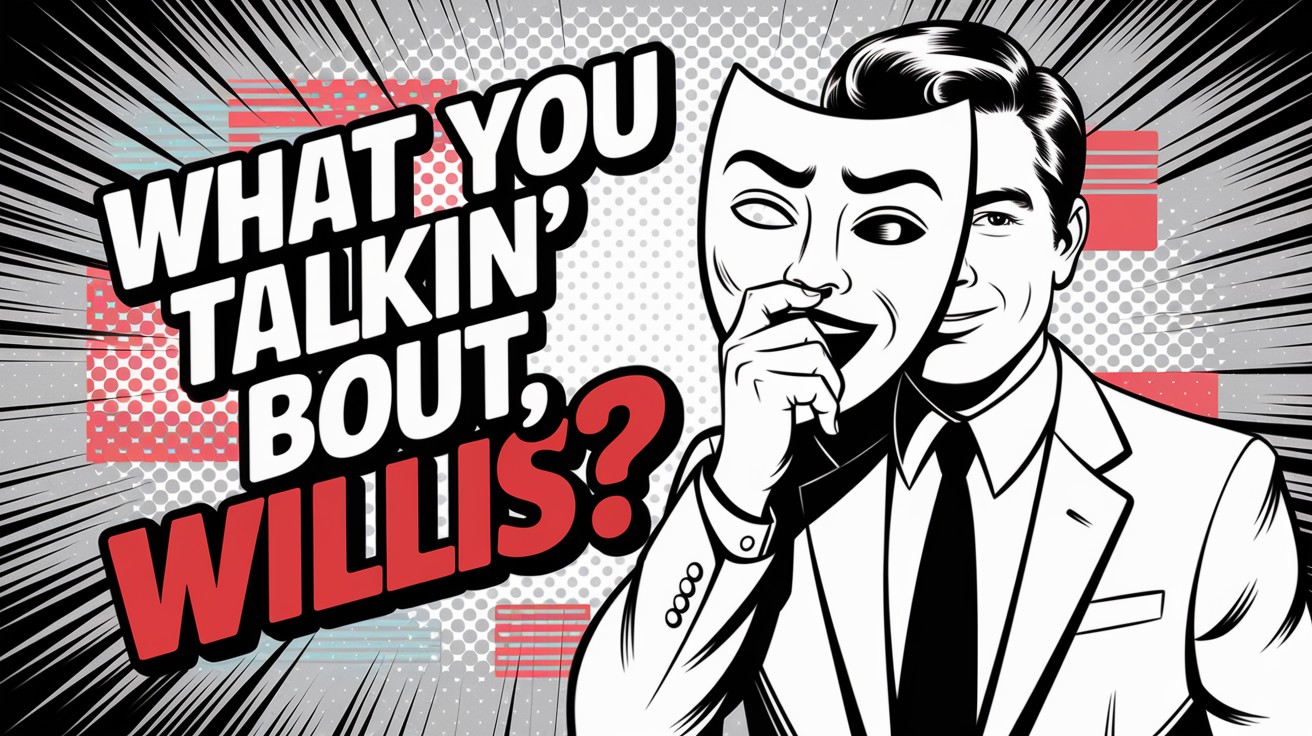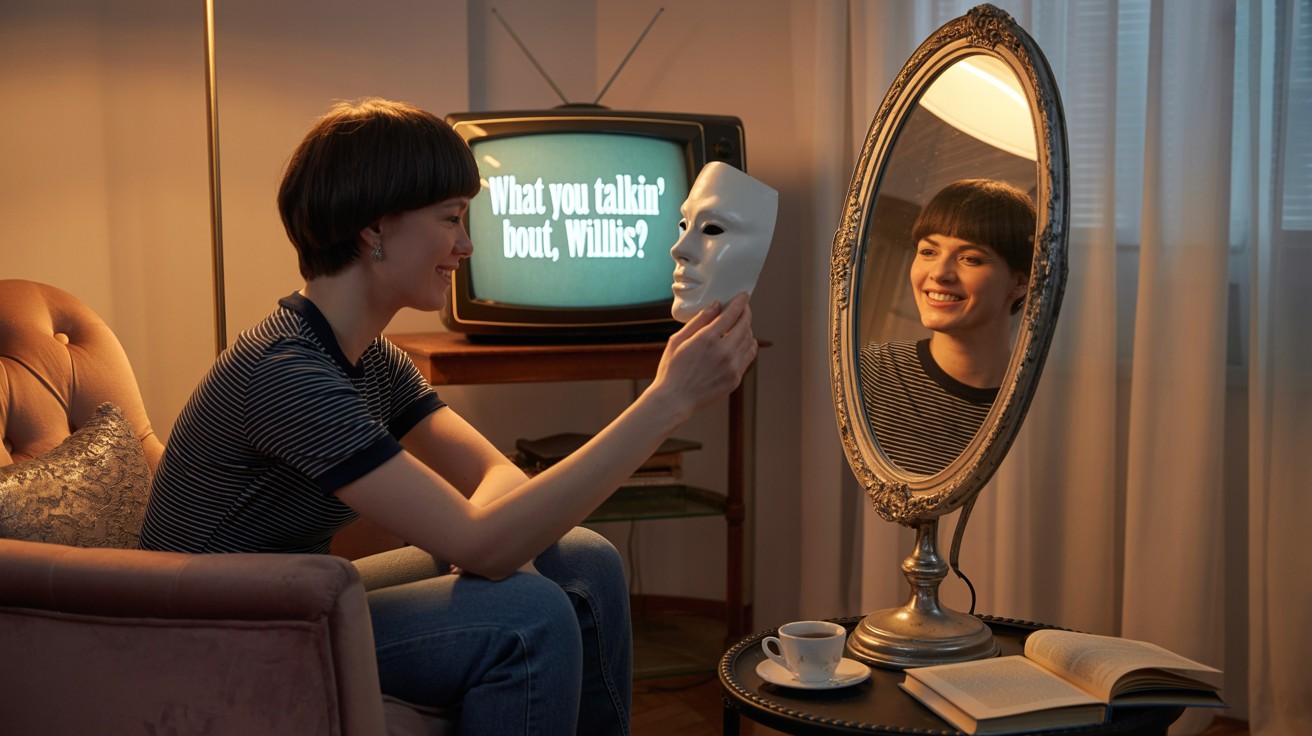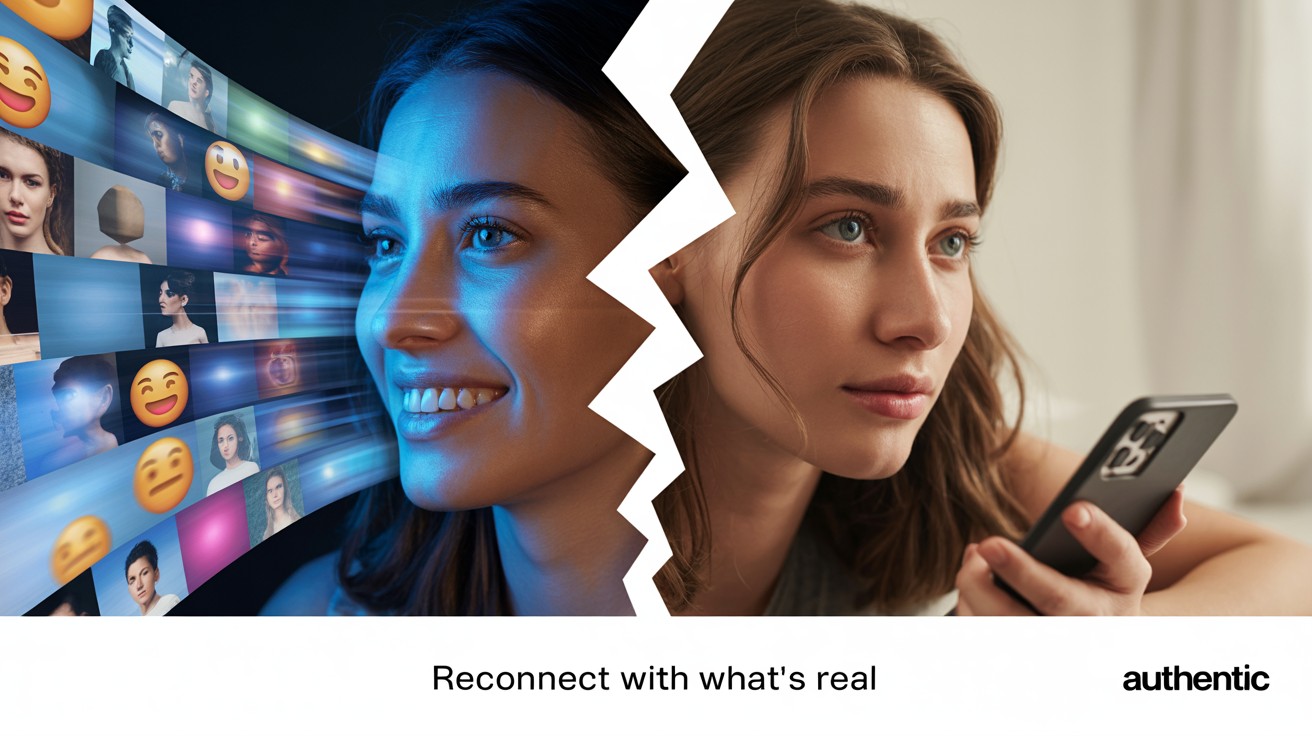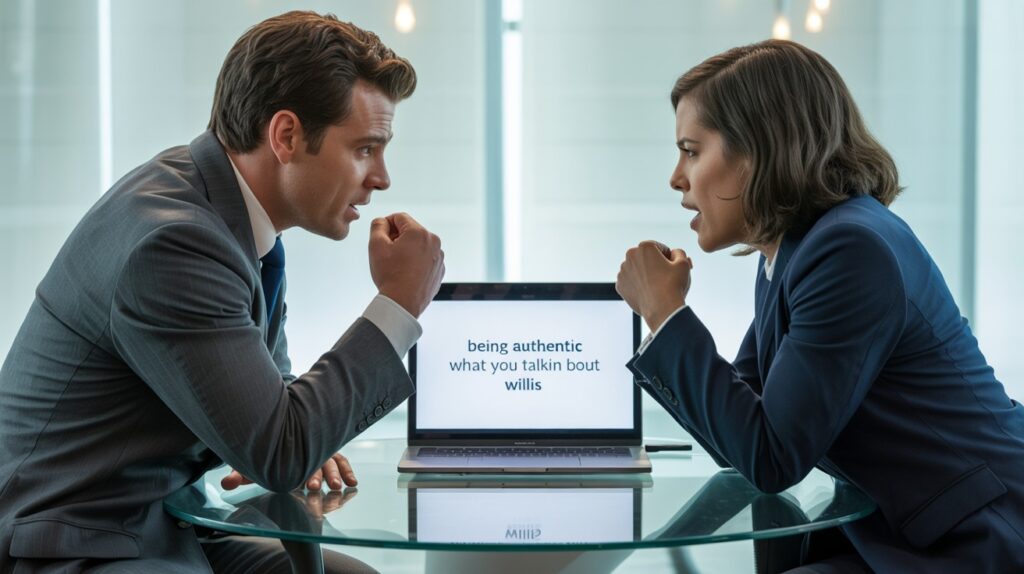Ever had that moment when someone’s acting fake and you just want to say, “being authentic whatutalkingboutwillis”?
We’ve all been there. In a world of filters, carefully curated social media, and the pressure to always present your “best self,” true authenticity has become rare and valuable.
This blog cuts through the noise to explore what being authentic really means in today’s world.
No complicated jargon or fancy psychology terms—just straight talk about why showing up as your genuine self matters and how it can transform your relationships, career, and personal happiness.
Whether you’re struggling with workplace personas, social media pressures, or just trying to figure out who you really are beneath all the expectations, you’ll find practical insights here that speak to your everyday experiences.
Ready to drop the act and embrace who you truly are? Let’s get real together.
What does “Being Authentic Whatutalkingboutwillis” Mean?

“Being authentic whatutalkingboutwillis” combines two powerful ideas in one catchy phrase:
First, “being authentic” means being your real self – not fake, not putting on an act. It’s about staying true to your values, speaking your truth, and living honestly.
The “whatutalkingboutwillis” part comes from the famous TV show “Diff’rent Strokes,” where the character Arnold (played by Gary Coleman) would say “What you talkin’ ’bout, Willis?” whenever he heard something surprising or unbelievable. This phrase became a way to call out nonsense.
Put together, this phrase means:
- Questioning fake behavior when you see it
- Calling out when someone isn’t being real
- Standing up for authenticity when others are just pretending
- Being honest yourself while encouraging others to do the same
In simple terms, it’s about keeping it real in a world full of fake, and not being afraid to question things that don’t seem genuine.
The Origin of Whatutalkingboutwillis

1. The Famous TV Catchphrase
- “Whatutalkingboutwillis” comes from the popular 1970s-80s sitcom “Diff’rent Strokes”
- Gary Coleman played Arnold Jackson, who often said “What you talkin’ ’bout, Willis?” to his older brother
- The phrase became one of the most recognizable catchphrases in TV history
- Arnold would use this line whenever he was confused, surprised, or didn’t believe what Willis was saying
- The catchphrase has remained authentic in pop culture for over 40 years
2. Why It Went Viral Before “Viral” Existed
- People found the phrase funny and started repeating it in everyday life
- The authentic delivery by Gary Coleman made it memorable and quotable
- The phrase appeared on t-shirts, buttons, and other merchandise
- It became a way for people to express disbelief in a humorous way
- The catchphrase crossed generational boundaries, with people being authentic in their appreciation
3. Modern Cultural Impact
- “Whatutalkingboutwillis” continues to appear in memes, GIFs, and social media
- The phrase represents questioning things that don’t make sense
- It has evolved to symbolize being authentic by challenging false or confusing statements
- Many people use variations of the phrase without knowing its origin
- The catchphrase embodies the spirit of authentic communication – direct, honest, and sometimes skeptical
4. Connection to Authenticity Movement
- The phrase now pairs with being authentic whatutalkingboutwillis as a call for honesty
- It symbolizes questioning fake behavior and calling out pretense
- The combined phrase encourages people to stay true to themselves
- It represents a fun way to promote authentic living in today’s often superficial world
- The catchphrase gives people permission to challenge insincerity with humor
How to Practice Authentic Living Without Oversharing
Know your boundaries: Being authentic doesn’t mean telling everyone everything. Decide what parts of your life are private and what you’re comfortable sharing with different people in your circle.
Share with purpose: When you do open up, have a clear reason why. Ask yourself if sharing this information helps build connection or if it’s just word vomit.
Listen to your gut feeling: Your body often knows when you’re about to overshare. That nervous flutter in your stomach might be warning you to pause and think first.
Practice selective vulnerability: Choose the right people for deeper sharing. Not everyone has earned access to your personal stories or struggles—reserve these for trusted friends.
Respect others’ privacy: Being authentic whatutalkingboutwillis means respecting that other people’s stories aren’t yours to share, even when telling your own authentic truth.
Start small: Test the waters with minor personal shares before diving into deeper topics. This helps you gauge others’ reactions and build trust gradually.
Focus on values, not drama: Share your core beliefs and principles rather than gossipy details. This keeps sharing authentic without becoming the neighborhood news channel.
Use the dinner party test: Before sharing something personal, ask, “Would I announce this at a dinner party?” If not, maybe it’s too intimate for casual conversation.
Why Join the Whatutalkingboutwillis Movement?

If you’re tired of surface-level living and craving something real, it’s time to lean in, here’s why you should join the Whatutalkingboutwillis movement.
1. Break Free From Social Pressure
- Escape the exhaustion of trying to be someone you’re not
- Stop worrying about what others expect from you
- Find relief from the constant performance of “perfect” living
- Reduce anxiety that comes from hiding your true thoughts and feelings
- Experience the freedom of being authentic whatutalkingboutwillis in all situations
2. Build Deeper Connections
- Attract friends who appreciate the real you, not a fake version
- Create more meaningful relationships based on honesty
- Inspire others to be authentic whatutalkingboutwillis in return
- Eliminate shallow connections that drain your energy
- Experience the joy of being truly seen and accepted
3. Find Your True Potential
- Identify your genuine strengths when you stop imitating others
- Pursue goals that actually matter to you, not society’s expectations
- Unlock creativity that comes from authentic self-expression
- Find your unique path instead of following the crowd
- Develop confidence in your authentic abilities and perspectives
4. Improve Your Mental Wellbeing
- Reduce the mental burden of maintaining different personas
- Experience less internal conflict between your actions and values
- Decrease stress from constantly filtering your words and behaviors
- Feel more content with who you truly are
- Practice being authentic whatutalkingboutwillis as a form of self-care
5. Become A Positive Influence
- Model authentic behavior for children and younger generations
- Create spaces where others feel safe to be themselves
- Challenge toxic fake culture in your community
- Encourage being authentic whatutalkingboutwillis in your workplace
- Help build a more honest, transparent society
Key Features of the Being Authentic
|
Feature |
Description |
|
Honesty |
Speaking truthfully without deception, even when it’s difficult |
|
Consistency |
Acting the same way regardless of who you’re with |
|
Self-awareness |
Understanding your true thoughts, feelings, and motivations |
|
Vulnerability |
Willingness to show imperfection and admit mistakes |
|
Value alignment |
Living according to your core principles and beliefs |
|
Transparency |
Being open about your intentions and reasons |
|
Boundary setting |
Clearly communicating your limits while respecting others |
|
Genuine expression |
Sharing thoughts and emotions without filtering or masking |
|
Personal accountability |
Taking responsibility for your actions and their impact |
|
Growth mindset |
Embracing change while staying true to your authentic self |
Why Authenticity Matters in the Digital Age

In today’s world of filtered photos and carefully crafted online personas, being authentic whatutalkingboutwillis matters more than ever.
Social media often shows only the highlight reels of people’s lives, creating impossible standards that nobody can truly live up to.
This digital mask-wearing leads many people to feel inadequate or like they’re always falling short. They compare their behind-the-scenes to everyone else’s highlight reel.
Authenticity cuts through this fakeness. When you’re real online, you create a refreshing space where others feel they can be themselves too.
Being authentic whatutalkingboutwillis online doesn’t mean oversharing every detail of your life. It simply means presenting yourself honestly without excessive filters or pretending.
Companies and influencers who embrace authenticity often build stronger, more loyal followings because people crave genuine connections in this digital world.
The next time you’re tempted to post only your perfect moments, consider sharing something real instead. Your authenticity might be exactly what someone else needs to see today.
Benefits of Being Authentic
- Being authentic whatutalkingboutwillis helps build stronger, more meaningful relationships based on trust.
- When you practice being authentic, you experience less stress from trying to maintain different personas.
- Authentic living leads to better decision-making that aligns with your true values and goals.
- People who embrace being authentic whatutalkingboutwillis often report higher levels of self-confidence.
- Being authentic creates a positive ripple effect, inspiring others around you to live more honestly.
- Workplaces that encourage being authentic see improved creativity, collaboration and employee satisfaction.
- Living an authentic life whatutalkingboutwillis helps you attract the right opportunities that match who you really are.
Conclusion
Living a life of being authentic whatutalkingboutwillis isn’t just a catchy phrase—it’s a powerful choice that can transform your relationships, reduce stress, and help you find your true path.
We’ve seen how authenticity builds trust, creates deeper connections, and frees you from the exhaustion of pretending to be someone you’re not.
Remember, being real doesn’t mean oversharing or ignoring boundaries. It means showing up as your genuine self, questioning what doesn’t feel right, and inspiring others through your honesty.
Start small by practicing authenticity in one area of your life this week. Then share your experience in the comments below!
Subscribe to our newsletter for weekly tips on authentic living, and don’t forget to check out our free “Authenticity Challenge” workbook to kickstart your journey.
Frequently Asked Questions
Can Being Authentic Hurt My Career?
Being authentic doesn’t mean sharing everything or ignoring workplace norms. It means bringing your real strengths to work while respecting professional boundaries. Many employers now value authentic employees who bring fresh perspectives.
How do I Balance Being Authentic With Being Polite?
Authenticity and kindness can coexist beautifully. You can express your true thoughts tactfully by focusing on “I” statements and choosing the right moment. Being authentic whatutalkingboutwillis is about honesty, not rudeness.
What If People Don’t Like The Real Me?
Not everyone will connect with the authentic you—and that’s okay! The right people will appreciate your genuine self. Being authentic whatutalkingboutwillis attracts quality relationships and filters out connections that wouldn’t last anyway.

